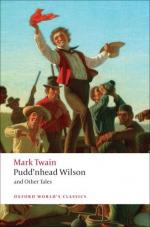Six days passed, then came more news. The old couple were dying. Richards’s mind cleared in his latest hour, and he sent for Burgess. Burgess said:
“Let the room be cleared. I think he wishes to say something in privacy.”
“No!” said Richards; “I want witnesses. I want you all to hear my confession, so that I may die a man, and not a dog. I was clean—artificially—like the rest; and like the rest I fell when temptation came. I signed a lie, and claimed the miserable sack. Mr. Burgess remembered that I had done him a service, and in gratitude (and ignorance) he suppressed my claim and saved me. You know the thing that was charged against Burgess years ago. My testimony, and mine alone, could have cleared him, and I was a coward and left him to suffer disgrace—”
“No—no—Mr. Richards, you—”
“My servant betrayed my secret to him—”
“No one has betrayed anything to me—”
—“And then he did a natural and justifiable thing; he repented of the saving kindness which he had done me, and he exposed me—as I deserved—”
“Never!—I make oath—”
“Out of my heart I forgive him.”
Burgess’s impassioned protestations fell upon deaf ears; the dying man passed away without knowing that once more he had done poor Burgess a wrong. The old wife died that night.
The last of the sacred Nineteen had fallen a prey to the fiendish sack; the town was stripped of the last rag of its ancient glory. Its mourning was not showy, but it was deep.
By act of the Legislature—upon prayer and petition—Hadleyburg was allowed to change its name to (never mind what—I will not give it away), and leave one word out of the motto that for many generations had graced the town’s official seal.
It is an honest town once more, and the man will have to rise early that catches it napping again.



